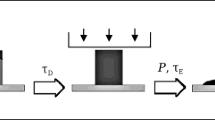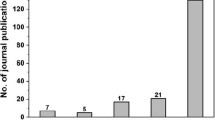Abstract
We have studied the moldability of molybdenum disilicide-based materials using free self-propagating high-temperature synthesis (SHS) compression, a method that combines combustion and high-temperature deformation processes. As a moldability criterion, we used strain. The strain of the synthesized materials has been determined experimentally as a function of the time delay before high-temperature deformation, compaction pressure, heating temperature, and metallic binder content of the starting mixture. To improve the plasticity of the synthesized material, 1–2 wt % titanium was added to the starting mixture as a metallic binder.
Similar content being viewed by others
References
Zaki, Z.I., Mostafa Nasser, Y., and Ahmed, Y.M., Synthesis of dense mullite MoSi2 composite for high temperature applications, Int. J. Refract. Met. Hard Mater., 2014, vol. 45, pp. 23–30.
Sharif, A.A., Misra, A., and Mitchell, T.E., Strength of MoSi2-based crystals at ultra-high temperature, Scr. Mater., 2005, vol. 52, pp. 399–402.
Kislyi, P.S., Badyan, A.Kh., Kindysheva, V.S., and Garibyan, F.S., Vysokotemperaturnye nemetallicheskie nagrevateli (High-Temperature Nonmetallic Heaters), Kiev: Naukova Dumka, 1981.
Tkachev, L.G. and Pogrebisskii, M.Ya., Computer simulation of resistance furnace heaters for metallurgical applications, Elektrometallurgiya, 2000, no. 9, pp. 42–46.
Lin, W.Y., Hsu, J.Y., and Speyer, R.F., Stability of molybdenum disilicide in combustion gas environments, J. Am. Ceram. Soc., 1994, vol. 77, no. 5, pp. 1162–1168.
Vasudeva, A.K. and Petrovic, J.J., A Comparative Overview of Molybdenum Disilicide Composites, 1992.
Yue Chen, Hammerschmidt, T., Pettifor, D.G., JiaXiang Shang, and Yue Zhang, Influence of vibrational entropy on structural stability of Nb–Si and Mo–Si systems at elevated temperatures, Acta Mater., 2009, vol. 57, pp. 2657–2664.
Rioult, F.A., Imhoff, S.D., Sakidja, R., and Perepezko, J.H., Transient oxidation of Mo–Si–B alloys: effect of the microstructure size scale, Acta Mater., 2009, vol. 57, pp. 4600–4613.
Mileiko, S.T., High-temperature metal matrix composites, J. Appl. Mech. Tech. Phys., 2014, vol. 55, no. 1, pp. 136–146.
Grammenos, I. and Tsakiropoulos, P., Study of the role of Hf, Mo and W additions in the microstructure of Nb–20Si silicide based alloys, Intermetallics, 2011, vol. 19, pp. 1612–1621.
Stolin, A.M. and Bazhin, P.M., Manufacture of multipurpose composite and ceramic materials in the combustion regime and high-temperature deformation (SHS extrusion), Theor. Found. Chem. Eng., 2014, vol. 48, no. 6, pp. 751–763.
Stolin, A.M. and Bazhin, P.M., SHS extrusion: an overview, Int. J. Self-Propag. High-Temp. Synth., 2014, vol. 23, no. 2, pp. 65–73.
Stolin, A.M., Bazhin, P.M., and Alymov, M.I., Preparation of nanostructured composite ceramic materials and products under conditions of a combination of combustion and high-temperature deformation (SHS extrusion), Nanotechnol. Russ., 2014, vol. 9, nos. 11–12, pp. 583–600.
Galyshev, S.N., Stolin, A.M., and Bazhin, P.M., Ti–Al intermetallics by free SHS compression, Inzh. Fiz., 2009, no. 9, pp. 25–28.
Galyshev, S.N., Stolin, A.M., and Bazhin, P.M., Preparation of nickel aluminide-based intermetallic materials by free SHS compression by free SHS compression, Inzh. Fiz., 2009, no. 9, pp. 25–28.
Stolin, A.M., Vrel, D., Galyshev, S.N., Hendaoui, A., Bazhin, P.M., and Sytschev, A.E., Hot forging of MAX compounds SHS-produced in the Ti–Al–C system, Int. J. Self-Propag. High-Temp. Synth., 2009, vol. 18, no. 3, pp. 194–199.
Author information
Authors and Affiliations
Corresponding author
Additional information
Original Russian Text © M.V. Mikheev, P.M. Bazhin, A.M. Stolin, M.I. Alymov, 2016, published in Neorganicheskie Materialy, 2016, Vol. 52, No. 2, pp. 173–179.
Rights and permissions
About this article
Cite this article
Mikheev, M.V., Bazhin, P.M., Stolin, A.M. et al. Effect of titanium on the rheological properties of MoSi2-based materials prepared by SHS. Inorg Mater 52, 141–146 (2016). https://doi.org/10.1134/S0020168516020102
Received:
Accepted:
Published:
Issue Date:
DOI: https://doi.org/10.1134/S0020168516020102




